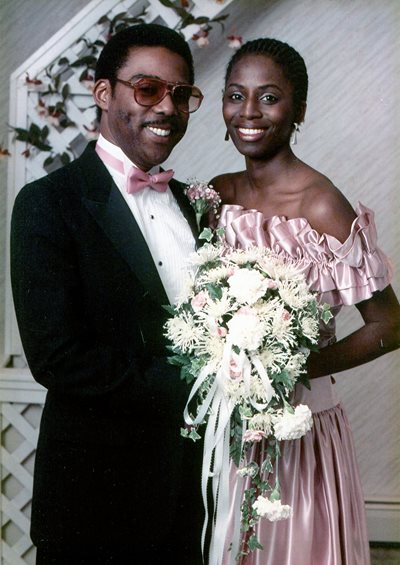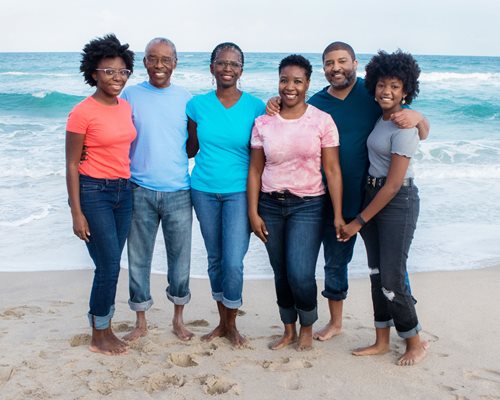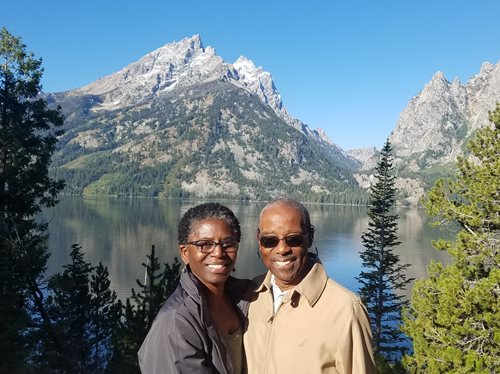Joe Oglesby was the highest-ranking Black newsroom executive at The Miami Herald when he announced his retirement in 2009. He and wife Linda Blash talked to us about his Alzheimer’s diagnosis and Joe’s involvement as a volunteer in an Alzheimer's clinical trial.
Tell us about you as a couple. How did you meet?
 Joe: We met in class at Harvard University in 1984 when Linda was a senior and I was a Nieman fellow studying public policy. The professor was often late, so we spent the time before lectures getting to know each other. I eventually invited her for coffee after class.
Joe: We met in class at Harvard University in 1984 when Linda was a senior and I was a Nieman fellow studying public policy. The professor was often late, so we spent the time before lectures getting to know each other. I eventually invited her for coffee after class.
Linda, tell us Joe’s diagnosis journey. What were the first signs or symptoms you saw of the disease?
Linda: In July 2017, we did a group tour of Peru. It was a fast-paced trip and Joe seemed to be having trouble keeping up with all the logistics. One night, he blew up, swearing, and called me a drill sergeant when I tried to explain what he needed to do to prepare for the next day. That was totally out of character. In the morning, he knew something had upset him — that something disturbing had happened — but he couldn’t remember any details.
I spent the next year watching and consulting with our daughters, encouraging Joe to talk to his doctor about the symptoms I had begun documenting — repeating questions, making purchases and withdrawals twice (because he didn’t remember making them the first time) and having more trouble than usual with technology. I eventually went with him to the doctor to make sure my concerns would be heard and taken seriously.
Joe: Prior to that, the doctor and I had lots of small talk, speaking about my journalism career and the fact that I was generally healthy overall. It was through Linda’s insistence that the doctor acknowledged that something was going on.
Tell us about the clinical trial at Brain Matters Research in South Florida.
Linda: In July 2018, once Joe’s primary care doctor realized that there might really be a problem, he recommended we visit the Brain Matters clinic in Delray Beach so Joe could be tested. Joe’s scores suggested mild dementia.
After learning about several trials that Joe could consider based on his test scores and other screening questions, weighing the pros and cons of each, we ultimately chose the Abbvie study, which is testing an anti-tau antibody drug. Three quarters of the people would get some amount of the drug, with only one quarter getting a placebo. And then, after two years, everyone who wanted to stay in the study would get the drug for the next phase. There were also additional tests — an MRI, PET scan, and physical over the next six weeks.
In August 2018, we learned Joe qualified for the trial, and that he had early-stage Alzheimer’s. That call came on my birthday. I was sad, because it confirmed that this was real, but I was also relieved to finally have a plan. In addition to the possibility that this drug might actually work, being part of the trial opened other pathways to help — classes, support groups, a way to monitor the progression of the disease.
Joe completed the double-blind Phase II part of the trial last summer. He’s now in Phase III, where everyone gets the test drug. The pandemic certainly complicated things — I waited in the car last summer in 90-degree heat instead of staying in the treatment room — but it’s a great team. The monthly visits are part of our lives now, and it’s just a 25-minute drive from home.
This particular study has the goal of slowing progression of the disease. I love spreadsheets and I use one to keep up with the details of the study, so I can see whether Joe’s numbers are changing. If there aren't huge changes in the negative direction, there's some comfort in that.
Why is it important for others to get involved in clinical trials, the Black community in particular?
Joe: When I was first diagnosed, I was in denial. I would tell people I had a little memory issue.
Today, I know I have this disease and that whatever happens, happens. But if I can do anything to help people have a better understanding of Alzheimer’s, the least I can do is volunteer, and hopefully this type of volunteerism will provide some sort of information that leads to insight.
When researchers finally find a treatment that helps people living with dementia, we want to make sure it works for us, as well as the rest of the population. If nothing else, I’m helping researchers understand how the disease affects Black Americans in a way that could be very useful.
Linda: The more open we are about what Joe is going through, the more comfortable people have gotten with acknowledging that this is a disease. Joe’s older sister died of early-onset Alzheimer’s in her early 60s. By the time we knew of her diagnosis, his sister was already far advanced in the disease, because people didn’t want to acknowledge it, or talk about it. Joe and I talk about it all the time.
What advice do you have for other people living with dementia and their caregivers?
Linda: One of the first things I did after Joe’s diagnosis was acknowledge that this wouldn’t be an easy road. I would need help to make sure I didn’t burn out trying to do too much for him, and not enough for myself. It is so important for care partners and caregivers to take care of the person they love, as well as themselves.
 I worked on that with our daughters, whether it was the one who lives locally giving me days off by hanging out with Joe, or the one in Minneapolis coming down for three months to help. Both were a godsend. This takes a village, and acknowledging that upfront was important for me.
I worked on that with our daughters, whether it was the one who lives locally giving me days off by hanging out with Joe, or the one in Minneapolis coming down for three months to help. Both were a godsend. This takes a village, and acknowledging that upfront was important for me.
Another thing we did early on is order purple wristbands that have our name, birthdate and contact info on them. I got Joe to wear one, as we came to terms with his diagnosis, but it occurred to me that I needed to wear one, too. If something were to happen to me, I would want people to know that I have someone I love who also needs help.
I also attended a Powerful Tools for Caregivers course that helped me realize that if a family is not on the same page when dealing with Alzheimer’s or other dementia, it just adds another layer of difficulty. Early on, we updated our wills and other legal documents. We knew that it was important to be realistic about the future and to make sure everyone was in agreement in terms of decisions we might eventually need to make. That gave us a little peace of mind.
What are your hopes for the future?
Joe: Linda encouraged me to keep a journal early on in this journey, and I wish I had. It should have been second nature for me, as a former journalist, but I resisted. I wish I had written down my history and logged what I was going through. I didn’t appreciate how quickly I would begin losing memories.
Knowing how this disease progresses, I hope I can continue to appreciate and enjoy the life I have for as long as possible: Golf and fishing, more time with family and friends, and more travel. I hope to be the best me I can be.
Linda: As our population ages, we’ll have more and more people being diagnosed with Alzheimer's or dementia. I hope evaluations become a routine part of annual exams so people can be diagnosed sooner. The less time we spend in denial, the more time we have to prepare for the future and to make the best of it.
Joe: If I was not married to Linda, who knows if I would have gotten this diagnosis. She was my advocate. Although I may not say it every day, I hope I show her how thankful and grateful I am to have her in my life, for everything she has done for me and for us.
 About: Joe Oglesby took on numerous assignments during his 40-year journalism career, ending with editorial page editor for the Miami Herald. In 1983, he shared a Pulitzer Prize with the editorial board for his pieces that argued for equal treatment of Haitian refugees. In 1984, he was named Journalist of the Year by the National Association of Black Journalists. Joe went on to earn the coveted Nieman Fellowship that allowed him to spend a year studying at Harvard University, where he met wife Linda Blash, 57. His career included stints at the Philadelphia Inquirer and the Columbia State Register, eventually landing back at the Herald.
About: Joe Oglesby took on numerous assignments during his 40-year journalism career, ending with editorial page editor for the Miami Herald. In 1983, he shared a Pulitzer Prize with the editorial board for his pieces that argued for equal treatment of Haitian refugees. In 1984, he was named Journalist of the Year by the National Association of Black Journalists. Joe went on to earn the coveted Nieman Fellowship that allowed him to spend a year studying at Harvard University, where he met wife Linda Blash, 57. His career included stints at the Philadelphia Inquirer and the Columbia State Register, eventually landing back at the Herald.
Joe remained active through the first ten years of his retirement. In 2010, when an earthquake devastated much of Haiti, he spearheaded the nonprofit Haiti News Project to help journalists get back on their feet and back to work.
Joe, 73, has three children, Joe Oglesby, Jr., Joy Oglesby, and Lee Oglesby. Joy is married to Ryan Welmaker, and they have a daughter, Lauren. Joe and Linda are recent pet parents to Cory, a three-year-old Shih Tzu, their first dog.